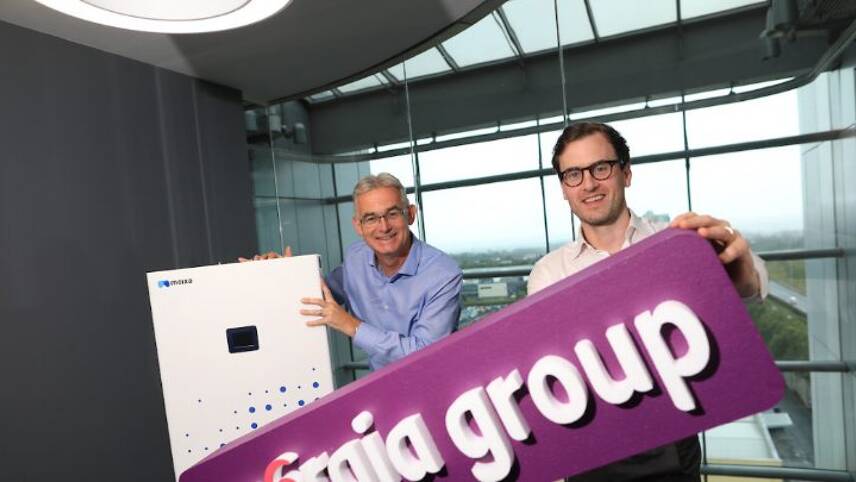Register for free and continue reading
Join our growing army of changemakers and get unlimited access to our premium content

Image: Moixa/Greenhouse
Under the scheme, Energia’s domestic energy customers will be offered a 4.8 kWh Moixa Smart Battery and a rooftop solar system, as well as an optional EV charging point for their property, for a reduced cost of approximately €7,400.
They will be incentivised to take this offering with information around how it could reduce their energy bills by as much as 50% and also claim back a €2,400 grant from the Irish Government.
The hope is to create a 120 kWh network in which participants can sell energy from their home and EV batteries for aggregation by Eirgrid, the Irish transmission system operator (TSO), at times of peak demand. Moixa’s GridShare software will embed artificial intelligence into the batteries, enabling the fleet of assets to react to market signals. This will enable the grid to balance demand as more renewable power comes online.
Eirgrid is notably striving to ensure that 40% of Ireland’s electricity comes from renewable sources by 2040 while maintaining supply security and grid stability.
Energia, meanwhile, is planning to add up to 1.5GW of renewable generation to the grid over the next five years through a string of investments, totalling €3bn.
“We work to not only generate renewable energy but also empower our customers so that they can manage their energy consumption and make positive decisions to maximise the potential of renewables, actively contributing to a low-carbon society,” Energia’s managing director for customer solutions Gary Ryan said.
“This project with Moixa will show how homes can become mini-power stations: generating, storing and supplying electricity, unlocking huge cost and carbon savings for customers and the network alike.”
Flexible futures
The announcement from Moixa comes shortly after the firm received £13m of funding through the UK Government’s Industrial Strategy Challenge Fund, in order to develop a VPP system in West Sussex.
As with the project in Ireland, the VPP in Shoreham-by-Sea and Worthing will incorporate solar panels, batteries and EV infrastructure. However, transport infrastructure and commercial properties are also taking part in the West Sussex scheme, alongside privately-owned homes and council properties.
Moixa claims that the model could cut the UK’s energy costs by 10% if it is rolled out nationally. In total, the firm now manages more than 8,000 domestic batteries in the UK and Japan.
The West Sussex VPP is one of four to have received Government backing under the Industrial Strategy Challenge Fund. A Virtual Energy System (VES) in Orkney, which aims to interlink local electricity, transport and heat networks into one system, thereby optimising efficiency and lowering emissions, is among the other schemes. The remaining two projects will both be hosted in Oxford.
Edie readers keen to get ahead of the curve and adapt their organisation’s energy approaches in preparation for ever-more decentralised and decarbonised energy systems are encouraged to download the free Flexible Futures: Smart Business Blueprint report.
Sponsored by EDF energy, the Blueprint provides some key energy technology and policy updates, along with an array of real-life case studies, expert viewpoints, facts and stats, and top tips to provide readers with the insight and inspiration needed to drive forward their energy agendas. Download and read the Blueprint free here.
Sarah George


Please login or Register to leave a comment.